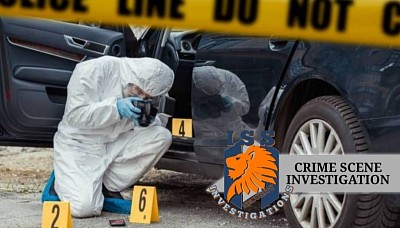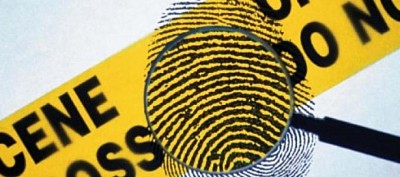Criminal Case Investigation
Below you can find a list of Criminal Crimes.
Criminal investigations can be broadly categorized by the type of crime they address. These include investigations into homicide, sexual crimes, theft, assault, and fraud. Additionally, investigations can be focused on specific areas like cybercrimes, housebreaking, or even criminal defense.
Here's a more detailed breakdown:
Specific Crime Types:
• Homicide: Investigating unlawful deaths caused by another person.
• Crimes Against Children: Investigating neglect, physical, and sexual abuse, as well as child pornography.
• Sexual Violence: Addressing a wide range of sexual crimes, including rape and sexual assault.
• Cybercrimes: Investigating crimes committed using computers, such as fraud, phishing, child exploitation, and cyberattacks.
• Theft: Investigating the taking of another's property without permission.
• Kidnapping: Investigating the unlawful taking and holding of a person against their will.
• Assault: Investigating physical attacks on others.
• Fraud: Investigating deceptive practices for personal or financial gain.
Other Specialized Areas:
• Housebreaking: Investigating the unlawful entry into a building or home.
• Criminal Defense Investigations: Conducting investigations to support the defense of an accused person.
• Fire and Arson Investigations: Investigating the cause and circumstances of fires and arson incidents.
• Bomb and Explosives Investigations: Investigating incidents involving bombs and explosives.
• Electronic Crime Investigations: Investigating crimes committed using electronic devices or networks.
• Death Investigations: Investigating the cause and circumstances of deaths, including homicides, suicides, and accidental deaths.
Heres a list of more Criminal offences:
*Aggravated Assault
*Insurance Fraud
*Aiding and Abetting / Accessory
*Kidnapping
*Arson
*Manslaughter: Involuntary
*Assault / Battery
*Manslaughter: Voluntary
*Attempt
*Medical Marijuana
*Bribery
*MIP: A Minor in Possession
*Burglary
*Money Laundering
*Child Abandonment
*Murder: First-degree
*Child Abuse
*Murder: Second-degree
*Child Pornography
*Open Container (of alcohol)
*Computer Crime
*Perjury
*Conspiracy
*Probation Violation
*Credit / Debit Card Fraud
*Prostitution
*Criminal Contempt of Court
*Public Intoxication
*Cyberbullying
*Pyramid Schemes
*Disorderly Conduct
*Racketeering / RICO
*Disturbing the Peace
*Rape
*Domestic Violence
*Robbery
*Drug Manufacturing and Cultivation
*Securities Fraud
*Drug Possession
*Sexual Assault
*Drug Trafficking / Distribution
*Shoplifting
*Solicitation
*Embezzlement
*Stalking
*Extortion
*Statutory Rape
*Forgery
*Tax Evasion / Fraud
*Fraud
*Telemarketing Fraud
*Harassment
*Theft
*Hate Crimes
*Vandalism
*Homicide
*White Collar Crimes
*Identity Theft
*Wire Fraud
*Indecent Exposure
Murder Investigations
Unveiling the Complexities of Murder Investigations
Murder investigations are complex, demanding, and essential for upholding justice. At ISS-Investigations, we pride ourselves on leveraging cutting-edge techniques, years of expertise, and an unrelenting commitment to uncovering the truth. In this article, we provide an in-depth exploration of murder investigations, delving into the processes, principles, and methodologies that private investigators employ to solve these cases.
The Critical Role of Private Investigators in Murder Cases
When families or clients feel that justice has been delayed or denied, they often turn to private investigators for help. Unlike police detectives who investigate crimes from the outset, private investigators typically become involved well after the crime has occurred. They rarely have the benefit of visiting active crime scenes, relying instead on documentation, evidence, and forensic analysis from previous investigations. This delayed access necessitates a methodical and meticulous approach to piecing together the truth.
Private investigators are particularly instrumental in:
- Cold cases where law enforcement efforts have stalled.
- Offering new perspectives and alternative theories.
- Providing detailed reports that can assist in reopening cases.
Below is a detailed look at the steps private investigators follow to solve murder cases effectively.
Comprehensive Steps in a Murder Investigation
1. Initial Consultation with the Client or Family
The first step is meeting with the victim’s family or the client to understand the background of the case. This is a critical phase for gathering information and creating a victimology profile. Understanding the victim—their lifestyle, habits, relationships, and potential conflicts—helps identify motives and suspects.
Key areas of inquiry include:
Victim’s lifestyle: Daily routines, habits, and activities.
Financial standing: Debt, disputes, or recent financial changes.
Relationships: Examining family, friends, acquaintances, and any known enemies.
This information serves as the foundation for the investigative process.
2. Accessing the Criminal Docket and Existing Evidence
Private investigators rely heavily on the criminal docket and evidence gathered during the original police investigation. These materials are critical for reconstructing the sequence of events and identifying gaps in the initial investigation.
Documents and evidence include:
Eyewitness accounts: Statements from those who may have seen the crime or suspicious activities.
Autopsy reports: Medical details about the cause and manner of death.
Physical evidence records: Fingerprints, bloodstains, and weapons recovered.
Observations from first responders: Notes on the crime scene’s initial state.
Collaboration with the Local Criminal Record Centre (LCRC) allows private investigators to access crime scene photographs, forensic data, and other crucial information.
3. Comprehensive Review of Physical and Environmental Evidence
Reconstructing the crime scene is a pivotal aspect of the investigation. Using the evidence and data from the criminal docket, investigators analyze the crime scene for:
Environmental factors: Signs of struggle, unusual disturbances, and scene layout.
Ballistics analysis: Examining firearms, trajectories, and bullet fragments to identify weapon types and usage.
Toxicology reports: Determining the presence of drugs, alcohol, or poisons in the victim’s system.
Trace evidence: Fibers, soil, and other materials that could link suspects to the scene.
By recreating the crime scene, investigators can pinpoint inconsistencies, uncover new leads, and develop a clearer picture of the events.
4. Conducting Interviews and Follow-Up Investigations
Private investigators often revisit witnesses, suspects, and associates to gather additional information or clarify discrepancies. Unlike police, who may have constraints on time and resources, private investigators can conduct in-depth interviews to uncover new leads.
Focus areas during interviews include:
- Verifying alibis.
- Identifying behavioral anomalies.
- Gathering corroborative or contradictory statements.
These interviews are vital in filling gaps left by the initial investigation.
5. Reporting and Collaboration
After analyzing all available evidence and conducting interviews, private investigators compile their findings into a detailed report. This report is shared with the client or the victim’s family and, in some cases, law enforcement.
Investigators may collaborate with police to present new evidence or insights that could aid in solving the case. The goal is always to ensure that justice is served.
Understanding the Legal Distinctions Between Murder and Manslaughter
What Is Murder?
Murder is the unlawful killing of another person with intent, often described as “malice aforethought.”
Key elements of murder include:
Premeditation: The act was planned in advance, even if the planning occurred moments before.
Recklessness: Actions taken with a disregard for human life that result in fatal consequences.
In South Africa, murder remains a critical issue. As of 2024, there were over 12,734 murders reported in the first half of the year—an average of 70 murders per day. This alarming statistic highlights the country’s ongoing struggle with violent crime.
What Is Manslaughter?
Manslaughter, though also a serious crime, differs from murder in that it lacks intent. It typically involves unintentional killing due to negligence or provocation.
Types of manslaughter include:
Voluntary manslaughter: Killing in the heat of passion or under provocation.
Involuntary manslaughter: Killing due to reckless or negligent actions, such as a fatal car accident.
Key Differences Between Murder and Manslaughter
1. Intent
- Murder requires evidence of intent or premeditation.
- Manslaughter lacks intent, often resulting from provocation or negligence.
2. Evidence
- Murder cases focus on evidence showing intent, such as emails, plans, or surveillance footage.
- Manslaughter cases center on negligence or external circumstances.
3. Penalties
- Murder carries severe penalties, including life imprisonment.
- Manslaughter typically results in lighter sentences, depending on the degree of negligence.
South Africa’s Legal Framework for Murder Investigations
Bail Considerations
Under South Africa’s Criminal Procedure Act, bail decisions for murder cases consider factors such as:
- Severity of the crime and public interest.
- Risk of flight or witness interference.
- Likelihood of reoffending.
Bail for murder cases is often difficult to obtain, with amounts ranging from R5,000 to over R100,000.
Sentencing Guidelines
- Life imprisonment for premeditated murder.
- Minimum sentences:
- 15 years for first-time offenders.
- 20 years for second offenses.
- 25 years for repeat offenders.
Questions Commonly Asked During Murder Investigations
- Who discovered the victim, and when?
- What was the victim’s last known activity?
- Are there any witnesses, surveillance footage, or potential suspects?
- Were there any disputes, threats, or unusual circumstances?
Conclusion
At ISS-Investigations, we understand that murder investigations demand a blend of science, intuition, and perseverance. Our commitment to solving these cases is unwavering, ensuring justice for the victim and peace of mind for their families. Whether you’re seeking answers, closure, or expert assistance, our team is ready to guide you through every step of the process. With expertise and dedication, we strive to shine a light on the darkest of mysteries and bring clarity to the unresolved.
Fraud Investigation
A fraud investigation is a systematic process that examines evidence to determine if someone has intentionally deceived others to benefit themselves:
• Purpose
The goal of a fraud investigation is to identify the perpetrator(s), assess the extent of the fraud, and take action to mitigate damage.
• Process
Fraud investigations involve:
• Gathering evidence
• Analyzing records
• Conducting interviews
• Verifying information
• Collaborating with law enforcement and regulatory agencies
• Objectives
The objectives of a fraud investigation are to:
• Determine if fraud has occurred
• Identify the fraud scheme and quantify losses
• Gather evidence to support legal action against perpetrators
• Make recommendations to prevent future occurrences
Fraud can affect individuals, corporations, and financial institutions, leading to significant financial losses and reputational harm.
Fraud awareness training and prevention are essential to deter individuals from engaging in fraud.
For Interest...
Private investigators are glamorized in the Movies on the Big Screen with futuristic tech gadgets and high-speed pursuits. Yes, their job is still pretty fascinating in the real world and there’s never a dull moment (except when you’re in a parked car for ten straight hours doing surveillance) As South African Investigators, we’d like to share our most popular private investigator cases as listed right here.
Yes, Solving Crimes and Handling a variety of Cases from finding Missing People to performing Background Checks. These Professionals are Dedicated and Passionate about finding answers. Private Investigators handle their cases in a way that offers Quality, Reliability, and Great Outcomes.
Computer Forensics or Cybercrime
Cyber Crimes are in the limelight these days. Several wrongdoings are happening around on the internet and therefore Computer Forensics are present where Professional Investigators solve these digital cases by utilizing the data and using different Techniques or Gadgets.
Common Cybercrimes are Spyware, Secret Phrase Phishing, or Hacking.
Crime Scene Investigation
Hiring a Professional Private Investigator is a wise decision to Solve the Crime Scene and carry out its Investigations. The Professionals inspect the location of the Crime to find clues and information that may help to reach the culprit. Plus, a more grounded case develops by gathering such clues. The specialists use this info and understand the Crime scene Skillfully.
Criminal Investigations
Private Investigators using the tactics find out the Criminals in such a Professional way. Because they are Experienced, they know how to get to the bottom of the story. They have earned such prestige in finding Criminals by working with Firms, Government Offices, Insurance Agencies, and Community people.









